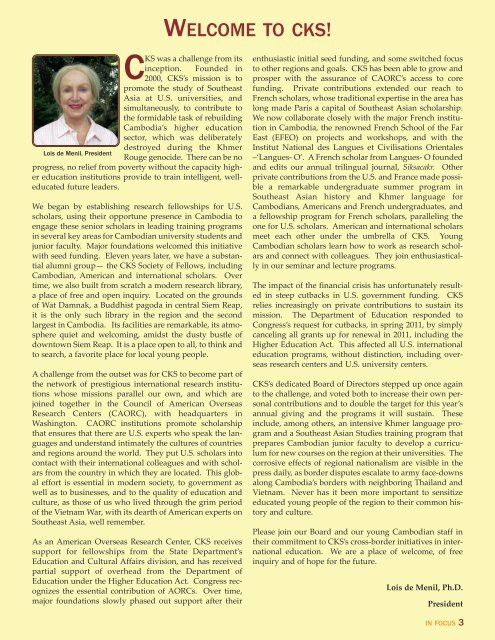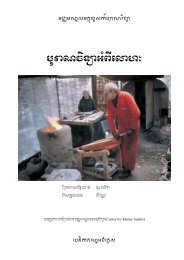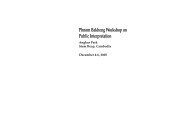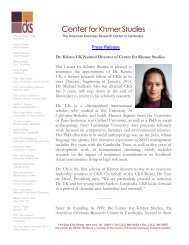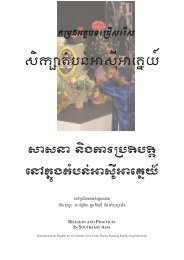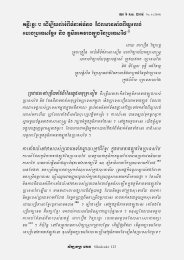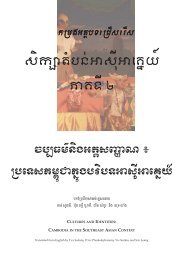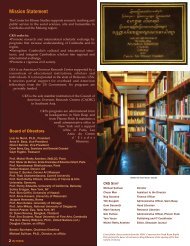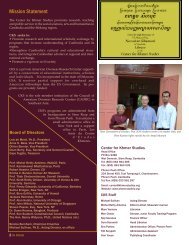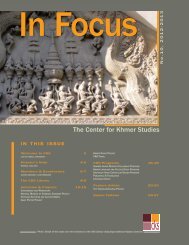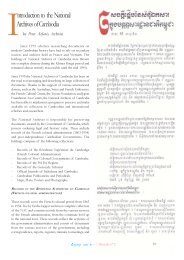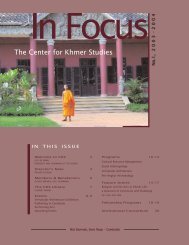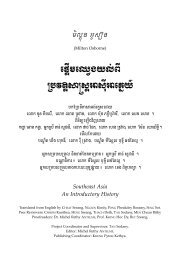2011-2012 - Center for Khmer Studies
2011-2012 - Center for Khmer Studies
2011-2012 - Center for Khmer Studies
- No tags were found...
Create successful ePaper yourself
Turn your PDF publications into a flip-book with our unique Google optimized e-Paper software.
WELcoME To cKs!cKS was a challenge from itsinception. Founded in2000, CKS’s mission is topromote the study of SoutheastAsia at U.S. universities, andsimultaneously, to contribute tothe <strong>for</strong>midable task of rebuildingCambodia’s higher educationsector, which was deliberatelydestroyed during the <strong>Khmer</strong>Lois de Menil, PresidentRouge genocide. There can be noprogress, no relief from poverty without the capacity highereducation institutions provide to train intelligent, welleducatedfuture leaders.We began by establishing research fellowships <strong>for</strong> U.S.scholars, using their opportune presence in Cambodia toengage these senior scholars in leading training programsin several key areas <strong>for</strong> Cambodian university students andjunior faculty. Major foundations welcomed this initiativewith seed funding. Eleven years later, we have a substantialalumni group— the CKS Society of Fellows, includingCambodian, American and international scholars. Overtime, we also built from scratch a modern research library,a place of free and open inquiry. Located on the groundsof Wat Damnak, a Buddhist pagoda in central Siem Reap,it is the only such library in the region and the secondlargest in Cambodia. Its facilities are remarkable, its atmospherequiet and welcoming, amidst the dusty bustle ofdowntown Siem Reap. It is a place open to all, to think andto search, a favorite place <strong>for</strong> local young people.A challenge from the outset was <strong>for</strong> CKS to become part ofthe network of prestigious international research institutionswhose missions parallel our own, and which arejoined together in the Council of American OverseasResearch <strong>Center</strong>s (CAORC), with headquarters inWashington. CAORC institutions promote scholarshipthat ensures that there are U.S. experts who speak the languagesand understand intimately the cultures of countriesand regions around the world. They put U.S. scholars intocontact with their international colleagues and with scholarsfrom the country in which they are located. This globalef<strong>for</strong>t is essential in modern society, to government aswell as to businesses, and to the quality of education andculture, as those of us who lived through the grim periodof the Vietnam War, with its dearth of American experts onSoutheast Asia, well remember.As an American Overseas Research <strong>Center</strong>, CKS receivessupport <strong>for</strong> fellowships from the State Department’sEducation and Cultural Affairs division, and has receivedpartial support of overhead from the Department ofEducation under the Higher Education Act. Congress recognizesthe essential contribution of AORCs. Over time,major foundations slowly phased out support after theirenthusiastic initial seed funding, and some switched focusto other regions and goals. CKS has been able to grow andprosper with the assurance of CAORC’s access to corefunding. Private contributions extended our reach toFrench scholars, whose traditional expertise in the area haslong made Paris a capital of Southeast Asian scholarship.We now collaborate closely with the major French institutionin Cambodia, the renowned French School of the FarEast (EFEO) on projects and workshops, and with theInstitut National des Langues et Civilisations Orientales–‘Langues- O’. A French scholar from Langues- O foundedand edits our annual trilingual journal, Siksacakr. Otherprivate contributions from the U.S. and France made possiblea remarkable undergraduate summer program inSoutheast Asian history and <strong>Khmer</strong> language <strong>for</strong>Cambodians, Americans and French undergraduates, anda fellowship program <strong>for</strong> French scholars, paralleling theone <strong>for</strong> U.S. scholars. American and international scholarsmeet each other under the umbrella of CKS. YoungCambodian scholars learn how to work as research scholarsand connect with colleagues. They join enthusiasticallyin our seminar and lecture programs.The impact of the financial crisis has un<strong>for</strong>tunately resultedin steep cutbacks in U.S. government funding. CKSrelies increasingly on private contributions to sustain itsmission. The Department of Education responded toCongress’s request <strong>for</strong> cutbacks, in spring <strong>2011</strong>, by simplycanceling all grants up <strong>for</strong> renewal in <strong>2011</strong>, including theHigher Education Act. This affected all U.S. internationaleducation programs, without distinction, including overseasresearch centers and U.S. university centers.CKS’s dedicated Board of Directors stepped up once againto the challenge, and voted both to increase their own personalcontributions and to double the target <strong>for</strong> this year’sannual giving and the programs it will sustain. Theseinclude, among others, an intensive <strong>Khmer</strong> language programand a Southeast Asian <strong>Studies</strong> training program thatprepares Cambodian junior faculty to develop a curriculum<strong>for</strong> new courses on the region at their universities. Thecorrosive effects of regional nationalism are visible in thepress daily, as border disputes escalate to army face-downsalong Cambodia’s borders with neighboring Thailand andVietnam. Never has it been more important to sensitizeeducated young people of the region to their common historyand culture.Please join our Board and our young Cambodian staff intheir commitment to CKS’s cross-border initiatives in internationaleducation. We are a place of welcome, of freeinquiry and of hope <strong>for</strong> the future.Lois de Menil, Ph.D.Presidentin focus 3


